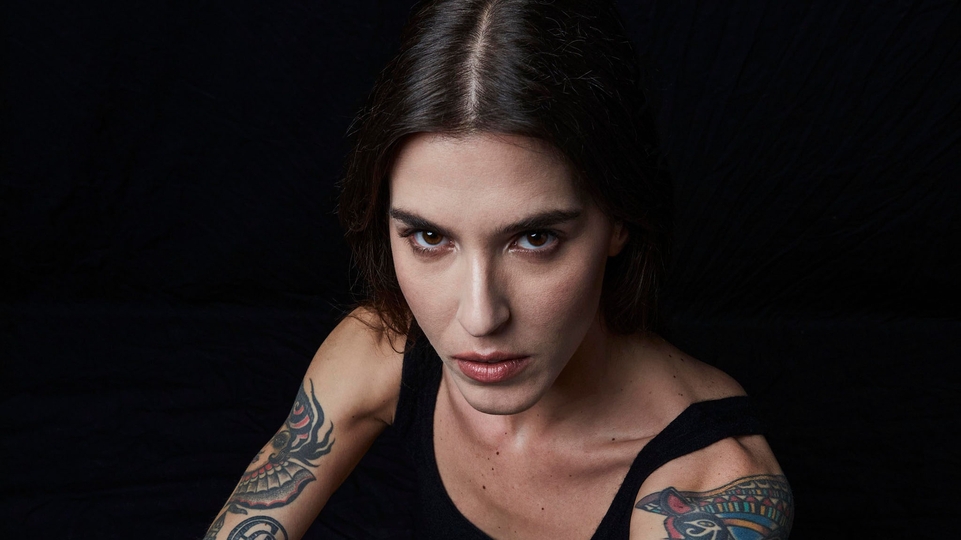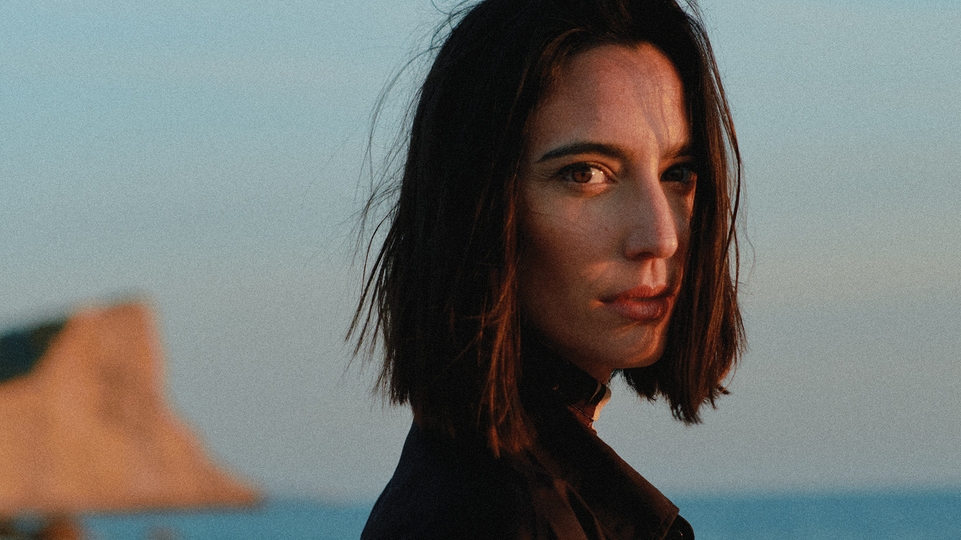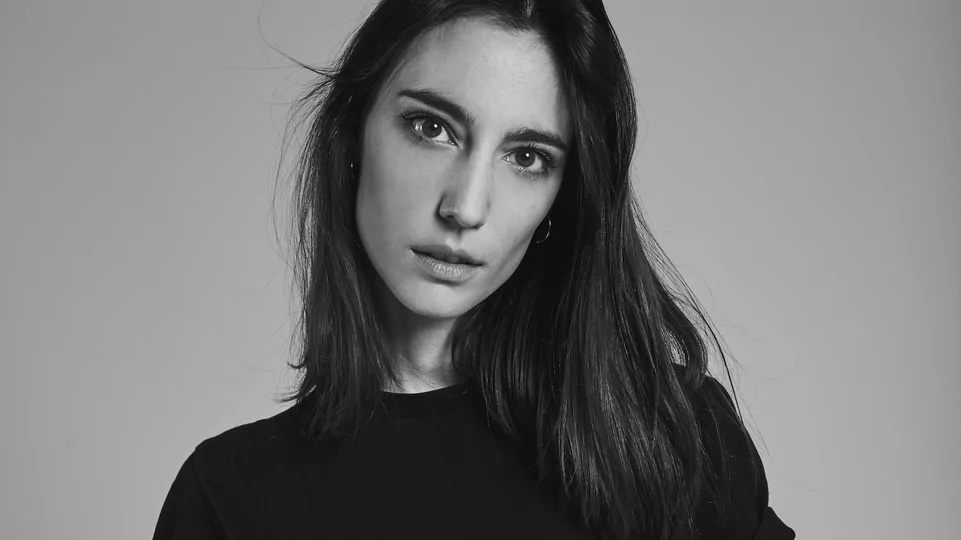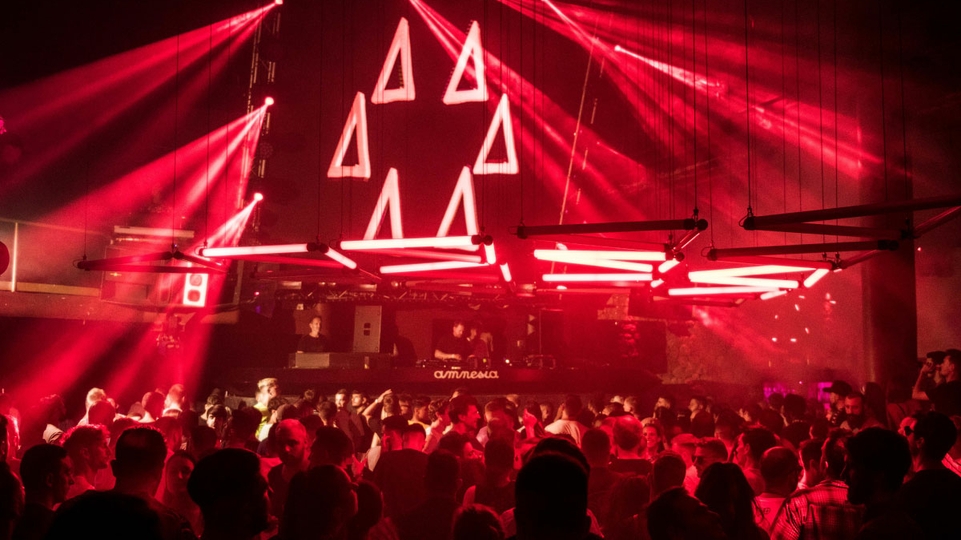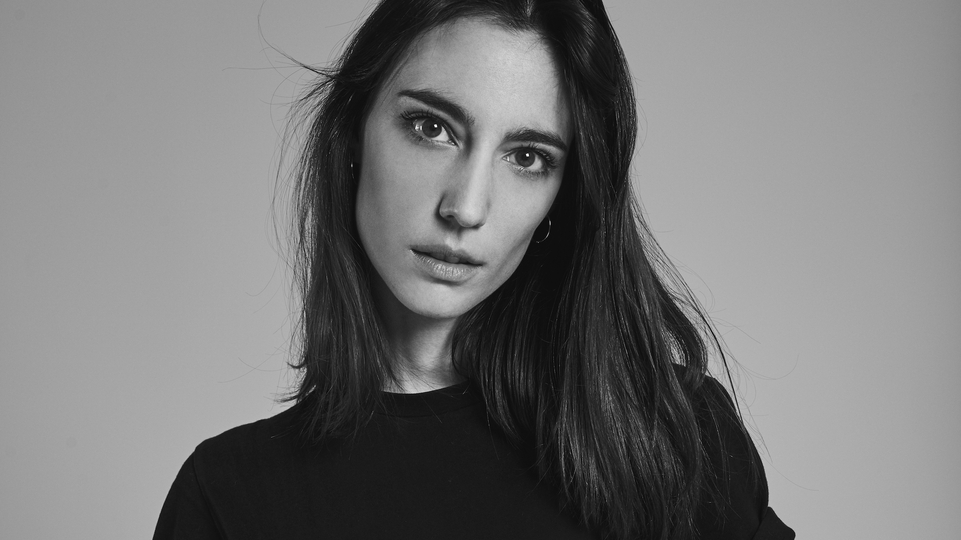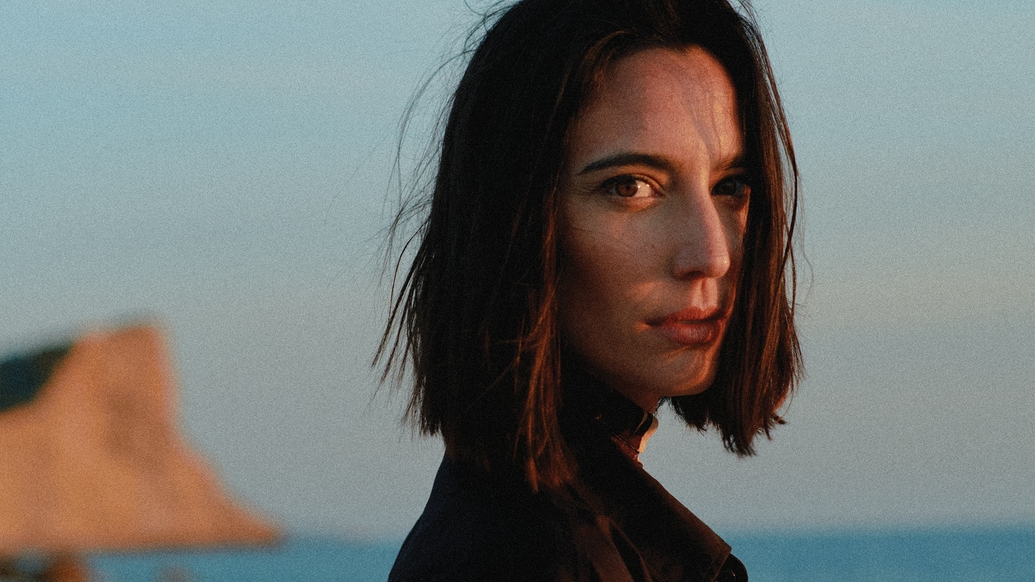
Amelie Lens: techno's unwavering optimist
Amelie Lens has taken techno by storm, bringing her hard, fast, but ultimately jubilant vision for the genre to the world’s biggest stages. A DJ, producer, and head of the Lenske and EXHALE labels and party brand — the latter of which she brings to Ibiza’s DC-10 this summer — Lens is using her platform to spread the values instilled in her during her upbringing: being thankful, independent, and supporting others. She speaks with Claire Francis about being raised by her grandmother, finding her confidence as a teenage clubber, and her hopes for the future
It’s bitterly early on a busy touring weekend when DJ Mag meets Amelie Lens. Despite this, she’s in bright spirits. We’re in Edinburgh, chatting ahead of her set at the techno-loaded Terminal V festival later this evening. Settled into a padded sofa in the hotel’s quiet café area, Lens is dressed in her customary head-to-toe black, but in sunny contrast she’s warm and welcoming, even as she confesses that she’s more nervous about the interview than her upcoming set. “This is the most nerve-wracking thing I’ve done in a long time,” she says.
It quickly becomes apparent that, whatever the situation, Amelie Lens is an optimist. Looking at her career trajectory alone, there are certainly plenty of reasons to be cheerful. The Lenske label boss and founder of the renowned EXHALE parties has enjoyed a meteoric rise in the past few years. With a staggeringly large fan base and a never-ending string of high-profile bookings that see her constantly touring the globe, it’s no exaggeration to say that Lens is one of big-room techno’s most unstoppable phenomenons.
From her breakout moments, which saw her garner support from the likes of Richie Hawtin (“Best hypnotic intense set I've heard in years,” he tweeted by way of endorsement, back in 2017), to her early productions being picked up by Pan-Pot and championed by Maceo Plex and Adam Beyer, Amelie Lens’ rapid ascent to techno royalty has seemed almost preordained.
Her success has been so swift it’s as though she came out of nowhere, and Lens has faced plenty of unfair criticism in that regard. Speaking to her at length over the course of the morning, it’s obvious that her good fortune is actually the result of extreme determination and hard work, and the fortitude to keep going despite even the toughest obstacles life has put in her way. Her uncanny ability to see the positives in every situation has been hard-earned from an early age.


One thing she likes to do when on the road is to take the time to walk around the city she’s visiting. Edinburgh, she enthuses, “is so beautiful”. The Scottish capital also brings about a glimpse into her childhood by way of its connections to a famous fictional character, in the process revealing a lot about the formative struggles she faced growing up.
“I got emotional, walking around, because I was like, ‘Oh my God, I feel like I’m in a Harry Potter movie’. I’m a nostalgic fan. For me, in my childhood, it gave me so much. I’m the same age, so I grew up with the characters. It was life changing for me. I could really relate to Harry Potter. Because he was also an orphan living with his aunt and feeling lonely, I really knew what that was like.”
Lens was born close to Brussels, and was raised alone by her mother — her father “was not really there”. When she was just five years old, her mother died aged 32, and she was sent to live with an aunt in an unhappy arrangement. “I have very few memories of my mother because I was only young, but we were super close because it was just the two of us,” she explains. “Of course, when she passed, it was like everything...” She pauses for a moment, clearly emotional. “I moved in with my aunt for about six months,” she continues. “It was not so nice there. So my family moved me to my other aunt and I was there for five years. She was strict, but it was a warm home; she loved me a lot and we are still very close.”
When she was 11, Lens moved again, this time to live with her grandmother, Elizabeth. It marked the start of a happy and more settled period, and she counts her grandmother as one of the most important people in her life. As her DJing career took off, she purchased Elizabeth a tablet so that they could stay closely connected while she tours, and fans will be familiar with her grandmother via her frequent presence on Lens’ social media accounts.
She describes Elizabeth, who is now in her mid-eighties, as “an amazing woman”, who has also endured more than her fair share of hardships. Lens’ great-grandmother disappeared during the war, leaving her grandmother to raise her five siblings. She went on to have six children of her own, but “he was not a great man, my grandfather,” Lens explains, “so they got divorced, and she raised the six children by herself. She had three jobs. She raised them great, she did an amazing job. And then she raised me.”
It’s heartwarming to hear the fondness in Lens’ voice when she speaks about her grandmother. “She’s super open-minded and so invested in everything I do. She did not have much, but she gave me everything. I always feel so connected with other people who were also raised by their grandmother. I feel like we are like old souls, because of that older connection. It’s a different education and way of seeing the world.”


“I always feel so connected with other people who were also raised by their grandmother. I feel like we are like old souls… It’s a different education and way of seeing the world.”
She describes herself now as a very open and sociable person, but says she was much more withdrawn as a child. “I never got close to other people, probably because I was afraid to get attached to anyone. I was a little bit distant. When I moved in with my grandmother, it got better.
“I was always by myself a lot,” she continues. “I was very creative, I liked to draw, and make jewellery, crafts... As an only child you just learn to be by yourself. But I’m grateful for it because I really think it made me who I am now. It helped me to really focus, learn things by myself, and be independent.”
Another welcome constant in Lens’ early life was, perhaps unsurprisingly, music. She began hitting clubs and parties at 15, with the ubiquitous presence of electronic music in Belgium providing a fertile environment to immerse herself in. It was the Myspace era, and she would reach out to artists online, asking them to put her on the guestlist for their shows so that she could get around the problem of not being old enough to legally enter venues. She went to gigs constantly — usually alone, as not many of her friends shared the same reverential passion for the scene.
“Everyone knows electronic music in Belgium, but not everyone was super into it. So I used to go alone, but thinking back this might have helped my career. Because all the promoters knew me as this 15-year-old girl with braces, who was always alone and in the front row and staying until the very end,” she laughs. “So when I was starting to DJ, I immediately got so much support because they saw me grow into it. It’s not like I came from nowhere for them. I was the weird girl from the front. And I also danced so hard, always. When I think back now it’s a bit embarrassing. I was really like... ‘Argh!’” she exclaims, waving her arms in the air in an imitation of her teenage self.
As well as being a regular presence at clubs around Belgium, she began collecting music. Her tastes were not purely confined to techno, and her influences point to the kind of uplifting, ebullient sounds that weave throughout her sets now, bringing an idiosyncratic edge to her hard and fast style. “I was super into minimal stuff like James Holden. My favourite set ever is Nicolas Jaar’s Resident Advisor podcast from 2010. It’s probably the mix I’ve listened to the most in my life. But also stuff like Boyz Noize — he was more electro back then. When I was 15 I went to see him all by myself, two hours by train.”


Lens adds that although the seeds of a career as a DJ were being sown at that point, for a long time she kept her ambitions a secret. “I like to learn so many things, and I’m always doing so many things, but I have a fear of failure. It’s a bit of a sad habit, I guess — I never want to talk about anything until I know I can do it. I wanted to be a DJ for so long, but I was afraid to say it out loud. “But now I tell everyone, especially my little nieces, if you have even the tiniest dream, you have to say it out loud, even just to yourself. Because then don’t hold back, you see opportunities and you focus on it, you know?”
Clubbing helped her build confidence. On the packed dancefloors she was welcomed into another kind of family, one where the atmosphere was free of judgement, and although she was going to events alone, she loved the sense of community these spaces offered. “As soon as you enter a club, you feel the acceptance,” she says. “It doesn’t matter who you are. When people tell me, ‘I want to come to your gig, but I have no friends who want to come’, I always say, ‘Everybody there is your friend, just come’. That’s what I did. I never had any friends like me, actually, to go with me to these events every week. Until I met my now-husband, Sam.”
Her relationship with Sam Deliaert (also a well-known DJ and techno producer, who started out under the alias Talbot Wood before switching to the moniker Farrago) is like something straight out of a techno fairytale. They met at a rave on her 18th birthday, have been together ever since, and were married in summer last year. It was with Sam’s support and encouragement that her dreams of becoming a DJ shifted towards reality.
“He was the first person I met who had this incredible passion for electronic music. We listened to the same artists. It was just the two of us all the time, and we would travel to gigs together all the time,” Lens recalls. “That’s really when it happened for me. Because Sam was a bedroom DJ and he had all this equipment at home. I was already making playlists and ordering my music, but not mixing. I think about it a lot — would I have bought that equipment myself? Because like I said, I was embarrassed to even say out loud that I wanted to be a DJ.
“He’s been there, from the very beginning. We started playing together in small bars. I had very big ambitions. And with Sam, I could always be super open. I was not ashamed to tell him my biggest dreams, even if they were unreachable. But I would not ever say this to anyone else except him.
“He always pushed me to learn by myself, both with DJing and producing. And back then it was a bit frustrating, but now I understand why and I do the same with people around me who want to learn. If you are serious about something you need to put the effort in, and the struggle and frustration is part of the learning experience.”
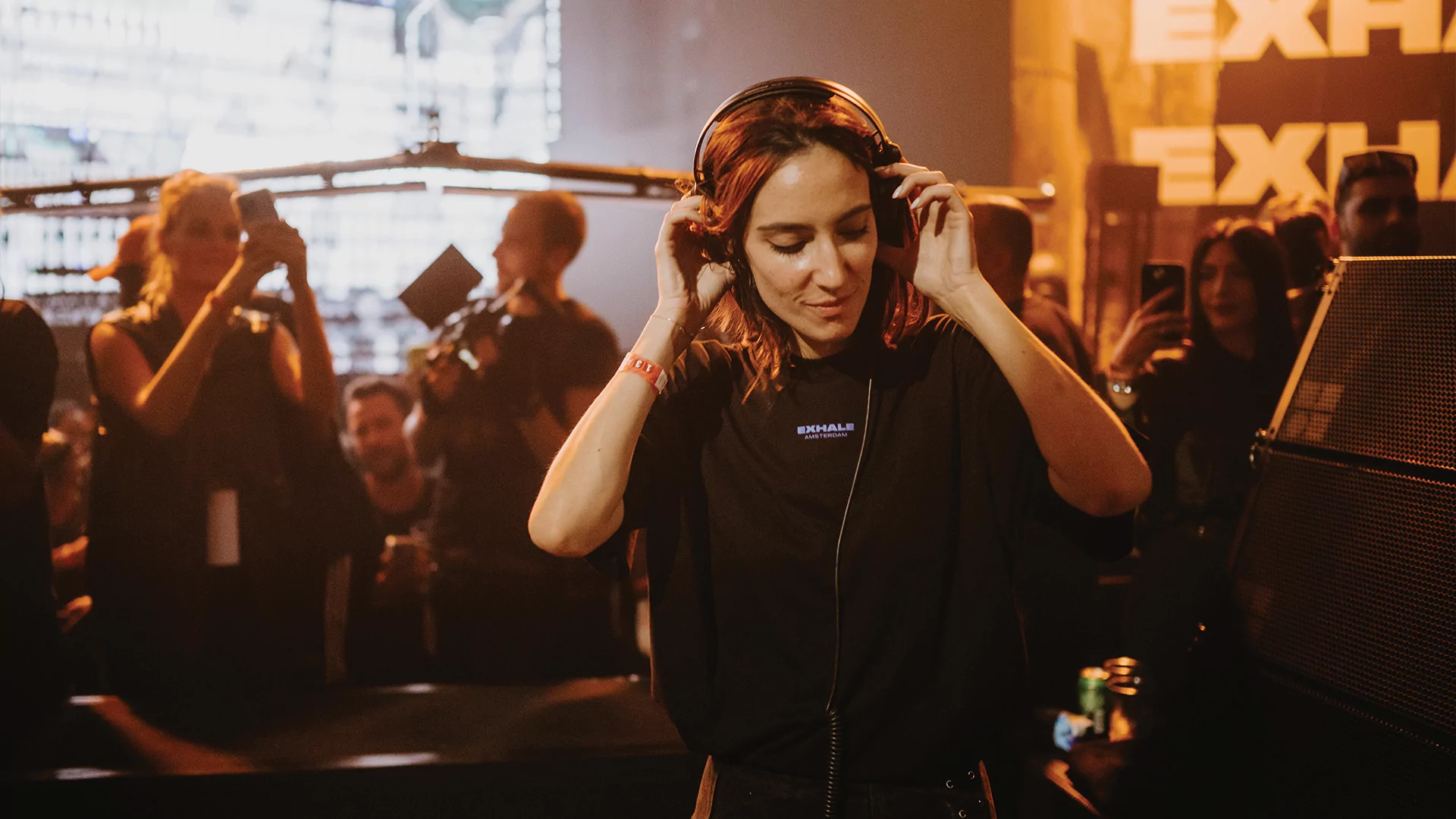

“When I was younger I was going alone all the time to parties, so now I am motivating my fans to come alone and connect and make friends. EXHALE brings people together, and I wish I had that when I was growing up.”
From those hesitant beginnings to now: Amelie Lens is undoubtedly at the top of her game, an assured and passionate performer. If forced to describe her DJ sets in one word, it would have to be ‘bangers’. She plays at full throttle, in a way that’s strangely polarising — people either love or loathe her style. “The only thing that I knew was that no one was actually doing what I wanted to do,” she says. “There was no one that I could compare myself to. No one was doing what I love the most, sound-wise. What I really wanted to do was really somewhere in between hard techno, but positive, you know? Not dark and oppressive.
“I consider myself a really positive, happy person. And when I play it makes me so happy, I’m always smiling. I think my music is not so dark, but it’s very hard, I guess. I also think that’s maybe what made me grow so fast. Because there was obviously a market for this sound.”
Her sound may be full-on, but Lens says she never aspired to be an international headlining DJ. When she was starting out, her biggest dream was to play at Awakenings Festival. But she wasn’t aiming for top billing. “I never wanted to be on the top. I just wanted to play. I thought if I could get to a place where I could play gigs on weekends, make music during the week, and be able to exist from my music, that would be enough.”
Things just kept on growing, though. Now, as well as her own label and party, Lens’ list of milestones includes mix compilations for Global Underground and fabric, non-stop tour dates at some of the world’s biggest techno festivals, and her own Ibiza residency at Ibizan hedonistic stronghold DC-10. Not to mention her two million-strong Instagram following, and crowds that border on devotional, with fans frequently showing their love by bringing personalised gifts to her shows.
She seems genuinely astounded by it all. “I say often, to Sam, that I don’t think you ever really get used to it. Where I am — I mean I’m so grateful, but it comes with so many... things that I never expected. You grow into something that you don’t really control anymore. And it becomes about what people expect from you. I don’t always want to be an example. I’m so grateful for it, but it was not my intention at all. I just really wanted to be a small headliner.”
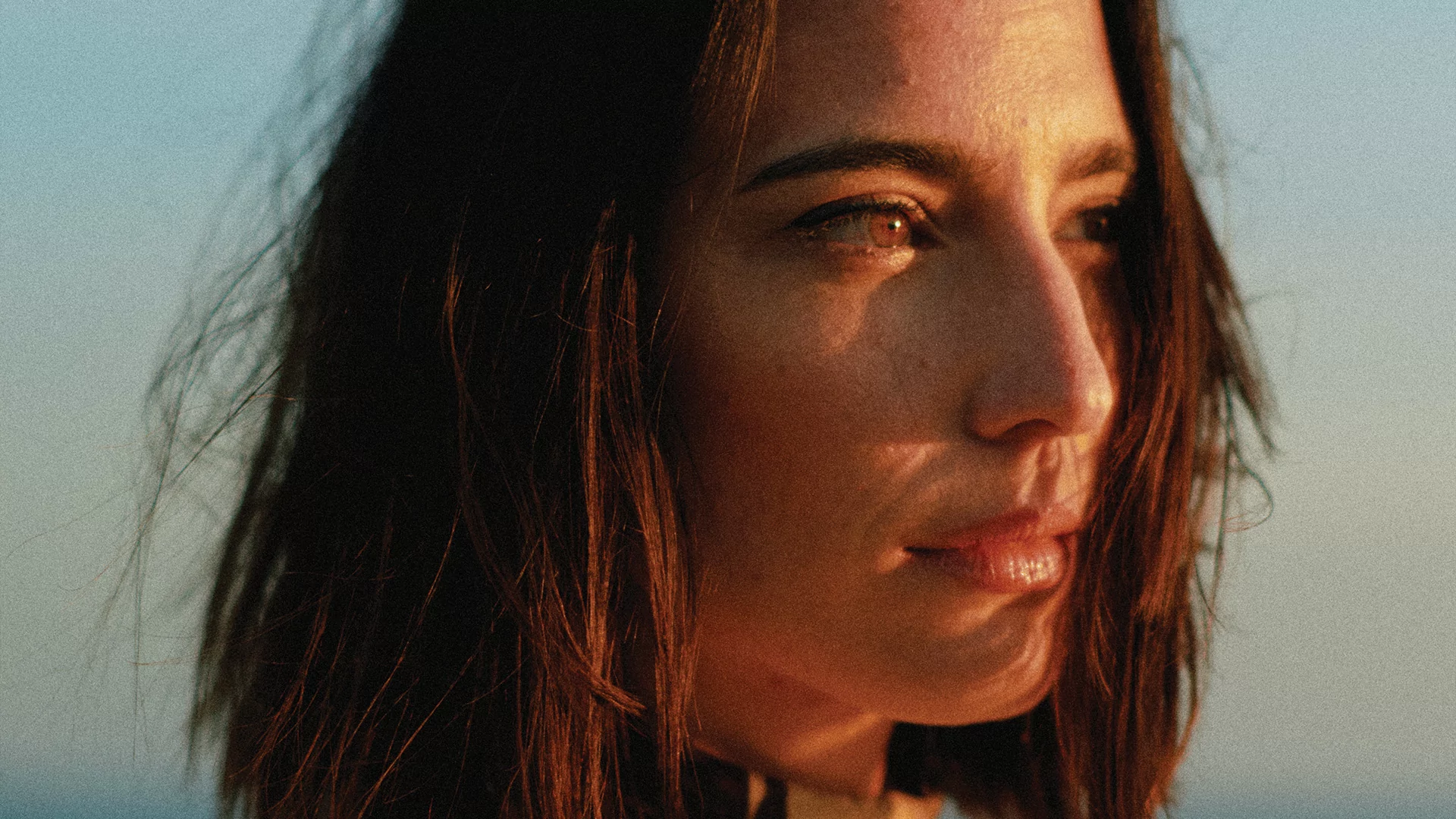

As well as copping criticism for being ‘too popular’ or ‘too mainstream’, she’s also had to deal with judgement surrounding everything from her skills as a performer, to her physical appearance, sartorial choices, and even the way she presents herself online. Her performances may have been endorsed by Richie Hawtin, but it was also Hawtin who came after her in an ill-advised ‘old man yelling at cloud’ moment in 2019, when he shared one of her selfies on his Instagram feed with the comment ‘Is this really necessary?’ Success in Lens’ case is truly a double-edged sword.
Before she started playing and producing under her birth name, she used a number of aliases, including the gender-neutral Renee. “It’s so stupid, and if I think back to it now it breaks my heart, really. But I just felt like I had to hide my gender to be taken seriously,” she explains. “I didn’t want people to see that I was a woman. When I was 18 I was really a girly girl. I liked wearing dresses. It’s so weird that I felt like, ‘Oh no, I cannot wear a dress. I should wear oversized t-shirts’. I felt like I had to wear this. When really, what does that have to do with my talent, or my music? Thankfully now I see it with the generation behind us, that they dress how they want. They’re mega-sexy and that’s fine, you know?”
And in terms of the detractors who say her sound is too commercial? “I always knew my sound was not for basements in Berlin,” she says firmly. “I never wanted to be underground, in terms of my sounds. People tell me, ‘Oh, but you’re not underground anymore’. And I think, was I ever? I always saw myself on festival stages, playing in a super-energetic way.
"In the small clubs, you know all the people around you. You experience the same story from the beginning, all together. I really loved this. But when I started playing the music I wanted to play, I knew it would not really fit in that environment.”
Lens adds that she is not a techno purist, but that she values the underground and DIY spirit of the genre. And she’s eager to stress that she has paid her dues. “Before I began playing the big festivals, I had many years of experience playing very small clubs. It is important to have experience as a DJ. I think people don’t know that I do have this experience. I started doing my own events when I was 19, and playing at all my own events. I even played house, tech-house, and deep house,” she laughs, “depending on where I was. I was a local warm-up DJ. I played warm-ups for Tale Of Us, but also for Len Faki, you know?”


What does she have to say to the people who say that her success is unearned, who think that she simply appeared from out of nowhere? “They don’t know me. They don’t know how I used to drive 10 hours to Dresden without sleep just to play a gig, and before my set I was doing the toilets, and after my set I was doing the coats,” she laughs. “They don’t know that. Someone left a comment somewhere online this week that said, ‘I saw you play 10 years ago’, and someone else had replied, ‘Where the fuck did you see her play 10 years ago?’ — like it couldn’t be true. They don’t know.”
One of the things Lens finds most gratifying about her dizzying success is the way that it’s allowed her to build the EXHALE community. From record label to international techno party juggernaut, the EXHALE brand allows her to champion and mentor up-and-coming artists, as well as cultivate a safe and inclusive space for fans. “EXHALE for me is so beautiful and important,” she enthuses. “Like I said, when I was younger I was going alone all the time to parties, so now I am motivating my fans to come alone and connect and make friends. EXHALE brings people together, and I wish I had that when I was growing up.”
She tells a story about how, last year, she received a message from a young girl who had been bothered by someone in a club and subsequently felt afraid to go to events alone. So Lens invited her along to her next event. “I took her with me to my show at Nuits Sonores in Lyon. She was like my tour manager for the day. She stayed with me on the stage for the whole set.” In another show of dedication, she also never says no to a photo.
The attitude Lens has towards her fans is almost one of motherly love. She communicates with many of them online and seems genuinely invested in their lives and their stories. She reads all of the comments she receives — “All of them,” she confirms. “It’s my community,” she continues. “For me, it’s all equal. I also go in the crowd all the time, especially at EXHALE events, because I think it’s important to feel the vibe. Of course, the first five minutes it’s crazy, because people are always like ‘Amelie! Amelie! Amelie!’” she laughs. Does she ever feel like she’s taking on too much of an emotional responsibility though?
Dealing with so many messages must take up a huge amount of time and energy, we suggest. “It does! But it’s important,” she retorts. “And for me it feels so normal to do that. Maybe it’s also how my grandmother raised me. All the time she asks me, ‘Did you thank your fans?’
“It’s a beautiful thing, to feel so much, because it works both ways,” she continues. “I’m an optimistic person. I think if you are a very sensitive, but also very negative person, it would be so hard. But because I’m so optimistic, and work hard to find the light everywhere, it’s fine. I feel happiness from so many small things.”
Where Amelie Lens sees clouds, she also sees silver linings. But during Covid she went through a particularly challenging time. Her father, with whom she “is very close”, she says, still emphasising the present tense, passed away. “My father came to visit me once a year or so when I was a child. But when I was 16 we really reconnected and I formed a really good connection with him. He was great.”
In the same period, Sam also became extremely ill following a severe stroke. “For two weeks I did not sleep, I did not eat, I was always crying. I was not allowed to see him, I was not even allowed in the ambulance because of Covid. They told me maybe I’ll have to dress him for the rest of his life.”


Thankfully, Sam has recovered and is now back to DJing -— he and Lens both play the same stage at Terminal V. But it’s obvious how gut-wrenchingly worried she was at the time. “I have no siblings, I lost both my parents. Sam has been in my life longer than anyone else, except for my grandmother. Sam is everything to me.”
On top of this, she was one of several artists who came under fire for playing events dubbed ‘plague raves’ during the pandemic. These gigs were big and crowded, and although technically legal, the ethics behind playing such events were heavily scrutinised. “It was legal — I would never do anything illegal — so I played. But when I got so much backlash from it, I of course thought about it more,” she explains. “To be really honest, I was so wrapped up with Sam’s recovery. But even if I'd had more time in my private life to consider it, I still would have done it. There was no good outcome for me. There was no winning. I wanted to help the promoters. They were struggling and almost begged me. I don’t regret it. I’ve made my peace with all the battles I cannot win.”
For many high-profile DJs, getting the work-life balance right is one of the toughest aspects of the job. Lens admits that she regrets not cancelling or postponing more of her gigs when she was severely ill with tonsillitis and fever in a frenetic period of touring post-Covid, when she had “two and a half summers’ worth of gigs in one”.
She works incredibly hard, but takes a lot of care to prioritise her well-being. She’s an advocate of veganism, and believes that a vegan diet has improved her health, including a chronic migraine issue. “It’s a huge part of my life. Obviously I was not raised as a vegan. My grandmother was raised on a farm, so my whole life it was milk, butter, cheese, meat,” she explains. “But later I thought, I’m just following what they taught me without thinking for myself. Does that align with my morals, and what I personally feel towards animals? And I was like, what am I doing? I really wish that someone told me so many years ago how great it is. You think that you have to give up everything, all your favourite foods, and social occasions. You think about all the negative things, because you don’t know the positive things.”
Looking ahead, there are more EXHALE releases on the cards, as well as an Ibiza season that will soon be in full swing. But there’s another — major — milestone that she is eager to add to her already impressive juggling act of responsibilities. It might be one of the biggest work-life challenges she’ll face, but she’s ready for the challenge. And if anyone can prove that there’s power in thinking positive, it’s Amelie Lens. “I really, really want to have children,” she reveals. “For so many years, I thought it’s not possible to have both, and that I had to choose. But now I’m really determined to make it work. I really want both my child and my career to be my priorities.
“Although I try to surround myself with women and my team is mostly women, the scene in general is still very male, and I’m not just talking about DJs — I’m talking about all the people behind the scenes: the agents, bookers, promoters. And it’s like a taboo and a bit of an awkward topic to even imagine someone being pregnant in nightlife. How do I have a child as a DJ, and be a mother, in that environment? I don’t know! But I really want to do it, so I’m going to make it work. I’m hopefully going to show one day that it’s possible.”

